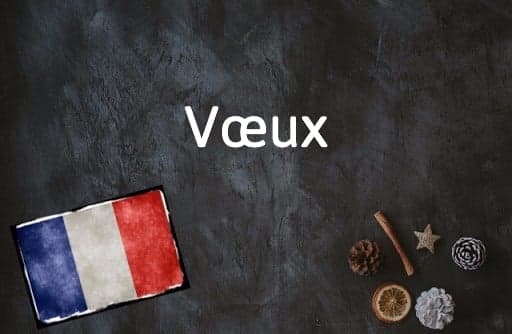French Word of the Day: Vœux

You can do this at a wedding and at the start of the New Year.
What does it mean?
Vœux – roughly pronounced vuh – is the plural form of the word vœu, and it is formally defined as a “vow or vows.”
However, you are more likely to see it used to mean a “greeting” or “wish.” For example, if you buy a birthday card for someone, you might find a section for “vœux d'anniversaire” (birthday wishes).
Simple greetings cards are called carte de vœux.
But there is one time of year when you will hear this term a lot - at the start of the New Year, when politicians and celebrities offer their meilleur vœux - best wishes and aspirations for the year - to the public.
In English, it would be best translated as to send your “good wishes or greetings.”
Traditionally the president makes a speech to the French people at New Year, and this is known simply as Les vœux.
Some parts of the word’s traditional meaning can still be seen in its more common usage - as it is still intended to be a communication of deep wishes or promises.
Originally, vœux had a religious connection - representing a promise that one would make to a higher power in hopes of gaining their favour. It can still be used to describe the religious duties taken on by monks, priests and nuns.
Use it like this
Le maire a publié une vidéo de ses vœux de nouvel an cette année, au lieu de faire un discours. – The mayor shared a video of his New Year’s greetings this year, instead of giving a speech.
La partie du magasin dédiée aux cartes de vœux est ma préférée. J'aime la créativité. – The greetings card section of the store is my favourite part. I love the creativity.
Comments
See Also
What does it mean?
Vœux – roughly pronounced vuh – is the plural form of the word vœu, and it is formally defined as a “vow or vows.”
However, you are more likely to see it used to mean a “greeting” or “wish.” For example, if you buy a birthday card for someone, you might find a section for “vœux d'anniversaire” (birthday wishes).
Simple greetings cards are called carte de vœux.
But there is one time of year when you will hear this term a lot - at the start of the New Year, when politicians and celebrities offer their meilleur vœux - best wishes and aspirations for the year - to the public.
In English, it would be best translated as to send your “good wishes or greetings.”
Traditionally the president makes a speech to the French people at New Year, and this is known simply as Les vœux.
Some parts of the word’s traditional meaning can still be seen in its more common usage - as it is still intended to be a communication of deep wishes or promises.
Originally, vœux had a religious connection - representing a promise that one would make to a higher power in hopes of gaining their favour. It can still be used to describe the religious duties taken on by monks, priests and nuns.
Use it like this
Le maire a publié une vidéo de ses vœux de nouvel an cette année, au lieu de faire un discours. – The mayor shared a video of his New Year’s greetings this year, instead of giving a speech.
La partie du magasin dédiée aux cartes de vœux est ma préférée. J'aime la créativité. – The greetings card section of the store is my favourite part. I love the creativity.
Join the conversation in our comments section below. Share your own views and experience and if you have a question or suggestion for our journalists then email us at [email protected].
Please keep comments civil, constructive and on topic – and make sure to read our terms of use before getting involved.
Please log in here to leave a comment.